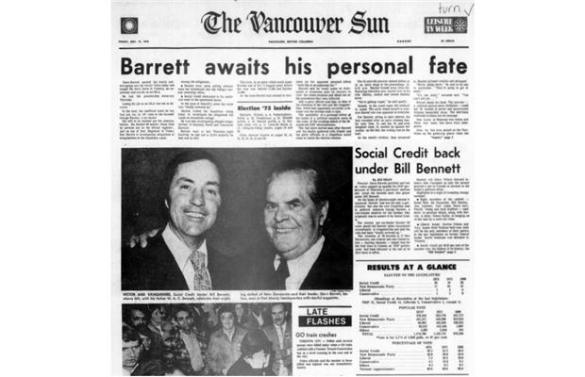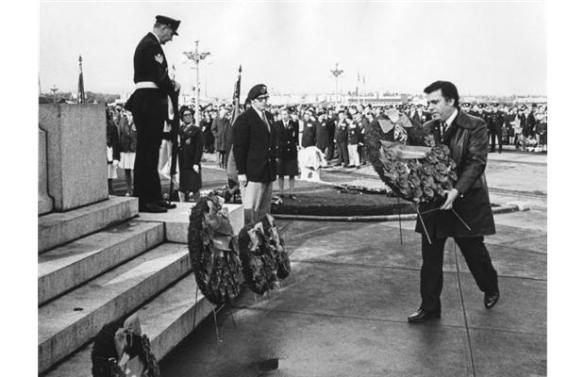rabble is expanding our Parliamentary Bureau and we need your help! Support us on Patreon today!
Forty years ago this month, all these things really happened.
The premier of British Columbia waited for the provincial election results with his wife and kids in a nondescript Coquitlam motel room behind closed drapes, the windows covered over by aluminum foil to discourage possible snipers. Plainclothes members of the RCMP prowled the corridors, making sure no one approached the premier's room to try and make good on several anonymous death threats Barrett had received.
It was a fitting end to the nastiest, most laced-with-hysteria election campaign in B.C.'s long polarized history.
The man under police guard was Dave Barrett. For the past 39 months he had led the province's first NDP government, transforming British Columbia from the iron-fisted, arcane administration of W.A.C. Bennett into a more modern era with a raft of unprecedented, progressive legislation. Now, it was up to the voters to decide if the NDP deserved a second term.
This time, Social Credit, under Bill Bennett, had united the right, whose fracture in 1972 provided Barrett with his large majority. And what a "right" it was. That thought of another "socialist" government caused mouths to foam. Hysteria and nastiness were afoot in the land.
When, alone among B.C. newspapers, the Victoria Times endorsed the NDP, advertisers pulled their ads. Editor George Oake had garbage dumped on his lawn. Angry readers phoned him at home. One vowed to kill him. Another promised to make sure Oake was sent back to Russia. When his wife Lorraine answered the phone, she was told she was "dirty" and did not raise her children properly.
Fernie alderman Gus Boersma announced he was going to run for the B.C. Conservatives. A dozen local businessmen and clients warned him his insurance business would suffer, if he hurt Socred chances in the riding. Boersma withdrew. "There's a fear campaign going on," he told a reporter.
Another Conservative hopeful in Prince George, Alan Anderton, received threatening phone calls from people he identified as "right-wing extremists", who ordered him to quit. As other Tory candidates dropped out, party leader Scott Wallace became furious. "Those people on the right screaming about the socialists having taken away individual freedom seem to be doing a pretty good job of it themselves, when they have the vindictiveness to blackmail you in the survival of your business," he raged.
It happened to Liberal candidates, too. Don Carter, the party's candidate in Kamloops, said local Social Credit members let him know his travel agency would suffer, if he didn't withdraw. According to party president Patrick Graham, many prospective Liberal candidates were intimidated into staying on the sidelines. "Horrible calls are coming in," Graham said. "We're being called Commie bastards, and worse. I've never seen anything like this. Not in Canada."
A government employee was punched and bodily evicted from a Social Credit rally, when he tried to yell a question at Bill Bennett. A meeting in Nanaimo was called off, after a telephoned bomb threat. At an all-party gathering in Steveston, non-Social Credit candidates were shouted down by a jeering mob that took up all the front rows.
A confidential federal government telex on the fate of B.C. Rail was stolen from an official's briefcase. The telex wound up in the hands of Bill Bennett, who revealed its contents at a raucous Social Credit election rally.
During the campaign's final, frantic days, outrageous ads appeared in newspapers across the province. "Thursday the election Is Freedom of Individual rights or Socialism", read one, paid for by "A Group of Concerned Citizens." The Canadian League of Rights rang out a warning against the NDP's alleged desire to nationalize all major industries in the province. "Is your business…your place of work next?" A Social Credit riding association put the question in blaring block letters: "IS BRITISH COLUMBIA HEADED FOR THE FATE OF SWEDEN?" (The ad did not think this was a good thing.)

With a day to go, Vancouver Sun columnist Jack Wasserman, who had himself been threatened for writing something critical of Social Credit, worried: "There is something Hitlerian about the atmosphere in which this election campaign [has been] carried out."
Sensing he was going down to defeat, Barrett wound up his fiery campaign with a heartfelt plea to the people: "I have one last message. This land is your land…We must never go back." The Social Credit campaign ended at the PNE, with MLA Bob McClelland riding in on an elephant.
Some of the hysteria carried over into the counting of ballots. A group of Social Credit scrutineers stormed into one of the tally rooms, demanding to put their own seals on the ballot boxes. When that was refused, they overturned tables before charging out, leaving behind broken glass and beer bottles. A returning officer at another riding was also harassed on election night. "It makes be boiling mad," chief electoral officer Ken Morton told reporters the next day.
But the outcome was never in doubt. Thirty-five minutes after the polls closed, sitting in his depressing motel room, Barrett gave a thumbs-down gesture and observed: "We're getting wiped." The only laugh came from his 14-year old daughter Jane, who said: "If they bring back the strap, I'm quitting school."

Arguably the most exciting government in Canadian history was out, done in by doing too much too fast, gaffes and unsettling the powers and shakers of British Columbia in a way they had never been rattled before. But the unsurpassed legacy of the Barrett government's brief time in office is with us still.
I itemized what they did during their scant 39 months for my book with Geoff Meggs on the Barrett years, The Art of the Impossible. The total came to 97. No government ever did so much in such a short period of time.
The Agricultural Land Reserve, ICBC, the most progressive labour code in North America, the best consumer protection legislation in Canada, the most far-reaching human rights code anywhere, with full-time human rights officers, rent controls, a Rentalsman, Mincome, Pharmacare, raising the minimum wage by 67 per cent, neighbourhood pubs, provincial ambulance service, the Islands Trust, independent boards of review for WCB appeals, Robson Square, preserving Cypress Bowl, B.C. Day, removing the sales tax from books, community health centres, B.C. Cancer Control Agency, buying Shaughnessy Hospital which became B.C. Children's Hospital, the SeaBus, banning the strap, scrapping a proposed coal port at Squamish, the Royal Hudson and Princess Marguerite, saving Victoria Harbour from development, the B.C. Energy Commission, purchase of Columbia Cellulose and Ocean Falls pulp mills, providing full bargaining rights to provincial government employees, an end to pay toilets, to the relief of all, and on and on.
The Dave Barrett government (1972-1975), RIP.

rabble is expanding our Parliamentary Bureau and we need your help! Support us on Patreon today!




Comments
Do
Don't